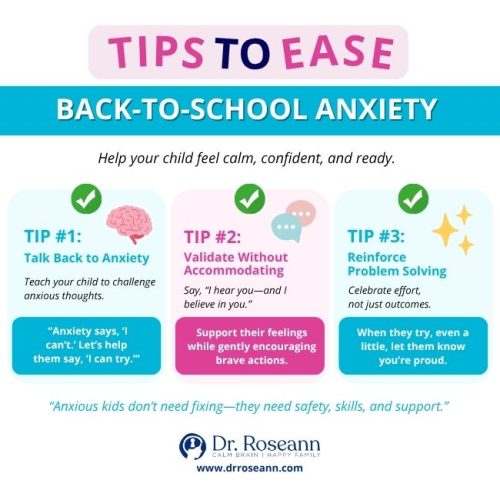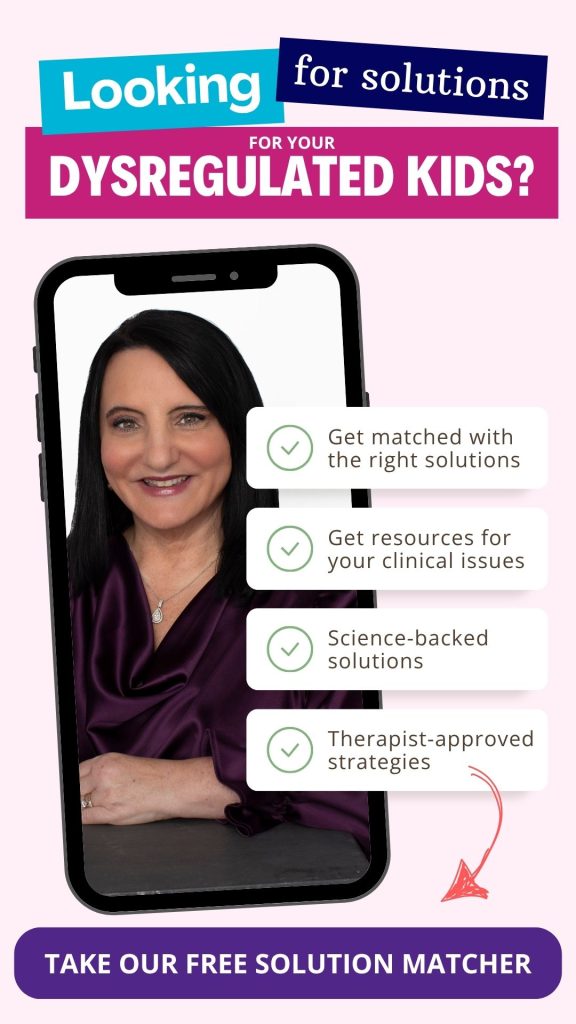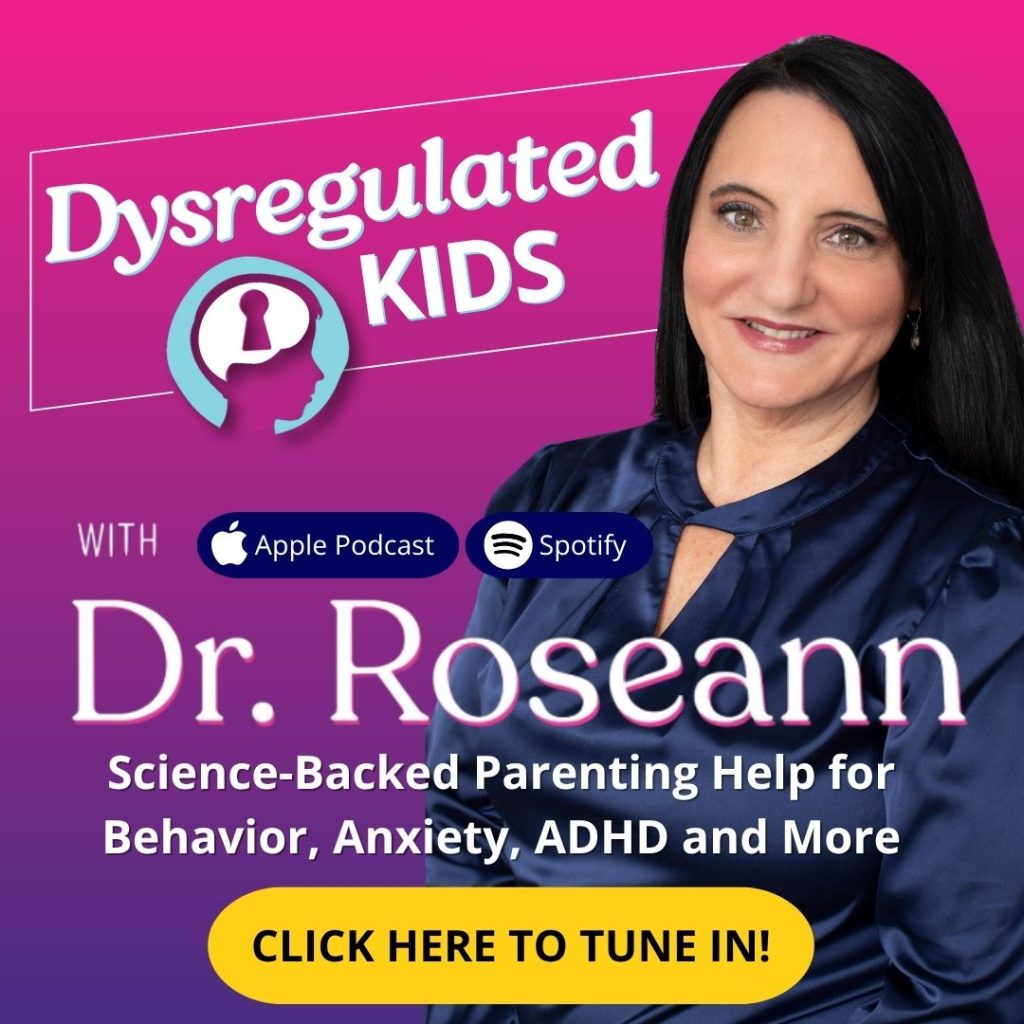Estimated reading time: 5 minutes
Back-to-school can feel overwhelming—not just for kids, but for the parents trying to hold it all together. Let me help you spot the signs and give your child tools to calm the chaos within so they feel safe and confident again.
What Is Back-to-School Anxiety and Why Does It Happen?
Back-to-school anxiety is normal—but for kids with nervous system dysregulation, like those with:
…it’s more than just nerves. Their brains aren’t jittery—they’re in full-on survival mode.
Common triggers include:
- Fear of getting sick
- Separation anxiety
- Social fears or rejection
- Academic pressure
- Routine changes
- Past bullying or exclusion
When a child’s brain is on high alert, even small tasks can feel overwhelming. But here’s the good news: When we calm the brain first, everything else starts to fall into place.
What are the Signs Your Child May Be Anxious About School?
Anxiety doesn’t always look like worry. It can show up as:
- Headaches or stomachaches
- Meltdowns or irritability
- Avoidance (“I forgot my backpack!”) (Rapee et al., 2023)
- Sleep issues
- Reassurance-seeking
- Physical symptoms like sweating or a racing heart
These aren’t defiance—they’re signs of a dysregulated nervous system.
As parents, what can we do for our kids that are worried about getting back to school?
Well, I have 3 tips to help ease back-to-school anxiety.

Tip #1: Teach Your Child to Talk Back to Their Anxiety
One of the best ways to support an anxious child is to teach them how to talk back to their worry brain—instead of letting it run the show.
| If Your Child Says... | Avoid This Response | Try This Instead |
|---|---|---|
| “I don’t want to ride the bus. I feel so lonely.” | “Okay, I’ll just drive you.” You’re actually reinforcing the anxiety. It teaches their brain: “Yup, this is something to avoid.” | “I hear you’re feeling lonely on the bus. What part feels the hardest?” Ask curious, open-ended questions. Let them name the feeling and explore it. Then, work together to come up with a plan—maybe they bring a comfort item, sit closer to the front, or say hi to one new person. |
This is how we build what I call stress inoculation—the ability to face discomfort in small, manageable ways that help the brain learn: “Hey, I can handle this.”
🧠 Parent Reminder: Talking through anxiety builds lifelong brain and body regulation skills.
Tip #2: Validate their Feelings and Be Supportive Without Accommodating Their Anxiety
Easing back-to-school anxiety starts with validating feelings while offering calm support—without reinforcing fear.
You might say:
- “I hear you’re having a hard time. How can I support you?”
- “You made it on the bus yesterday—amazing! What felt different?”
These can help your child feel seen and remind their brain: “I can do hard things—even when it’s uncomfortable.”
Supportive language is emotional first aid. It doesn’t erase anxiety, but it shows they’re not alone.
Need help with what to say? My Teletherapy Toolkit™ is packed with ready-to-use phrases that calm—not coddle—the worry.
Read more about: Anxiety Treatment for Children: How to Help Your Child Calm Their Brain and Find Relief
Tip #3: Give Positive Reinforcement For Problem Solving
Want a surprisingly simple way to build your child’s confidence? Start by noticing the effort, not just the end result.
Positive reinforcement is one of the most powerful brain-shaping tools we have (Law et al., 2012). From a neuroscience perspective, it wires the brain to repeat behaviors we want to see—especially when kids are learning how to manage anxiety.
Even tiny wins deserve big praise. You might say:
- “Wow, you really handled that like a champ. High five!”
Or with a teen:
- “I saw you picked your clothes up without being asked. I’m proud of you for taking responsibility.”
Those may feel like small moments. But they send a loud message: “I’m capable, even when things feel hard.”
Because let’s be honest—kids don’t need perfection. They need reinforcement that progress matters.
Even if your child’s still stuck in the thick of it—meltdowns, worries, resistance—your encouragement sticks. Your voice becomes part of their inner voice.
You’re helping them build real coping skills that will last well beyond the school year.
Need more support? Watch my YouTube video on How to Help Your Child Handle Back-to-School Anxiety.
Parent Action Steps
FAQs
Is back-to-school anxiety normal, or should I be concerned?
Some worry is completely normal, especially with changes in routine. But if your child is melting down daily, avoiding school, or having physical symptoms, their nervous system may be in distress—and it’s time to offer extra support.
Isn’t it okay to let them skip something that makes them anxious?
Avoiding fear may bring short-term relief, but it reinforces anxiety in the long run. Instead, guide them through small steps that build confidence and show their brain, “I can handle this.”
How can I help if I’m feeling overwhelmed myself?
Start small. Regulating your own nervous system—through breathwork, routine, or support—helps you co-regulate with your child. Remember: your calm is their calm.
Citations
Law, B. M., Siu, A. M., & Shek, D. T. (2012). Recognition for positive behavior as a critical youth development construct: conceptual bases and implications on youth service development. The Scientific World Journal, 2012, 809578. https://doi.org/10.1100/2012/809578
Rapee, R. M., Creswell, C., Kendall, P. C., Pine, D. S., & Waters, A. M. (2023). Anxiety disorders in children and adolescents: A summary and overview of the literature. Behaviour Research and Therapy, 168, 104376. https://doi.org/10.1016/j.brat.2023.104376
Always remember… “Calm Brain, Happy Family™”
Disclaimer: This article is not intended to give health advice and it is recommended to consult with a physician before beginning any new wellness regime. *The effectiveness of diagnosis and treatment vary by patient and condition. Dr. Roseann Capanna-Hodge, LLC does not guarantee certain results.
Are you looking for SOLUTIONS for your struggling child or teen?
Dr. Roseann and her team are all about science-backed solutions, so you are in the right place!










